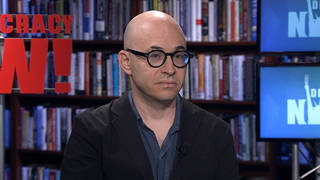
An estimated 52,000 students took to the streets of London on Tuesday to protest government plans to increase university tuition fees while cutting higher education funding by 40 percent. The demonstration was one of the biggest student protests in decades and the largest turnout against the British government’s austerity measures that were announced last month. We speak with Johann Hari, a columnist for the London Independent. [includes rush transcript]
Transcript
JUAN GONZALEZ: An estimated 52,000 students took to the streets of London on Tuesday to protest government plans to increase university tuition fees while cutting higher education funding by 40 percent. The protest began with a peaceful march, but later in the afternoon a small minority of demonstrators stormed the headquarters of Prime Minister David Cameron’s Conservative Party. They clashed with baton-wielding police, shattered windows. Some managed to reach the roof of the building and hurled objects down onto the street below. Some 14 people were injured, and police arrested 35 demonstrators.
Tuesday’s protest was one of the biggest student protests in decades and the largest turnout against the British government’s austerity measures that were announced last month. The president of the National Union of Students, Aaron Porter, strongly condemned the violence and said it shouldn’t detract from the message of the demonstration.
AARON PORTER: I absolutely condemn the actions of a small minority who have used violent means to hijack this protest. Fifty thousand students came here to make a peaceful protest about a serious issue which is very important. And if some people think it’s appropriate to use violence, it’s an utter disgrace, and they have completely hijacked this opportunity to make a serious point.
JUAN GONZALEZ: The National Union of Students is threatening to try to unseat lawmakers who go back on their pre-election pledges to oppose a rise in tuition fees. Chief among them is the Liberal Democrat leader, Deputy Prime Minister Nick Clegg, who now supports a three-fold increase in the fees that would allow universities to charge up to 9,000 British pounds. Clegg had a fiery exchange in the British Parliament Tuesday morning over reneging on his promise to oppose tuition fee hikes.
DEPUTY PRIME MINISTER NICK CLEGG: Of course I acknowledge this is a — this is an extraordinarily difficult issue. And I’ve been entirely open about the fact that we have not been able to deliver — we have not been able to deliver the policy that we held in opposition. Because of the financial situation, because of the compromises of the coalition government, we have had to put forward a different policy.
JUAN GONZALEZ: Well, for more, I’m joined now from London via Democracy Now! stream by journalist Johann Hari. He’s a columnist for the London Independent and also writes for the Huffington Post.
Welcome to Democracy Now!
JOHANN HARI: Hey, Juan. Great to be with you.
JUAN GONZALEZ: Well, tell us, what’s been the reaction to this protest in the general public? And why — how did the students so rapidly mobilize such a large force to oppose these hikes in the intuition as well as cuts in services?
JOHANN HARI: I think there’s a real sense of shock. And the fact that it was such a big demonstration really shows that. The government is talking about cutting the budget for university teaching by 80 percent — that’s eight-zero percent — and tripling the cost to students who are going to the best universities. And you’ve got to understand, this is part of a much bigger package that the government is imposing. These aren’t just the biggest cuts in my lifetime. These aren’t just the biggest cuts in my mother’s lifetime. These are even the biggest cuts in my grandmother’s lifetime. To go back to the last time there was this big a cut in public spending in Britain, you have to go back to the year before my grandmother was born, 1919. We’re talking about an absolutely massive cut that’s targeted hugely disproportionately at the people who can least afford it and did least to cause this recession — the poor.
So, to give you one example of another really shocking cut, we have a system in Britain called housing benefit, where if you can’t get a home, the government will pay for you to rent somewhere. And the government, the Conservative-Liberal Democrat government, is cutting that budget so dramatically that in London alone, 200,000 poor people are just going to be forced to leave the city. They’re not going to be able to afford to live here. Even the Conservative mayor, Boris Johnson, called it “Kosovo-style social cleansing.”
And I’ll give you just one example of the human cost of this. I went to report on one of the councils that David Cameron said inspired him, a Conservative-led council that’s been in power for a few years now, Hammersmith and Fulham. There, there were pregnant women sleeping on the floor in the park, because they couldn’t get homes anymore. That’s the cost of the austerity that’s being imposed here and that the Tea Party would love to impose on the United States, as well.
JUAN GONZALEZ: Now, as recently as the late ’90s, tuition in many universities in England was free. Could you give us a sense of how rapidly costs have escalated there?
JOHANN HARI: Yeah, it was free in the first year I went to university, and then they’ve been massively increased. So, at every stage they’ve been increased and ramped up and ramped up. So now we’re talking about 9,000 pounds a year to go to the best universities. It will cost more to go somewhere like Oxford or Cambridge than it will go go to another university, so you’ll have even more poor people being priced out of there. I was the first person in my family to go to university after the age of 16. And this kind of program would make it really hard for someone like me.
JUAN GONZALEZ: Now, you wrote recently in the Huffington Post that protest works and that this is having an effect on the government. Could you explain?
JOHANN HARI: Well, one of the things that’s really inspiring about this is how big and how inventive the protest and fightback movement is. And I think this is really helpful for American viewers, where the only fightback that we’re seeing over here from you guys seems to be from this massive exercise in false consciousness, the Tea Party, where people claim to be standing up frontally and they’re in fact installed in office later, stooges for Wall Street and other vested interests. Here, there’s been a much more interesting fightback.
I’ll give you a good example. One of the biggest corporations in Britain is called Vodafone, a cell phone company. And for over six years now, they have been basically refusing to pay taxes on a massive part of their business. They’ve been claiming that it’s routed through Luxembourg, where they pay almost no tax. But it isn’t. And Private Eye, the investigative magazine, calculated they had racked up a bill of six billion pounds to the equivalent of the IRS here. That would be enough to cancel all the cuts in housing benefit that are going to force 200,000 people out of London alone this year. And there was, when this came — but what happened is when the Conservatives came to office, George Osborne, David Cameron’s finance minister, effectively canceled their outstanding tax bill. He reduced it to a sixth of what was legally due. So, it’s a really striking illustration of the priorities: you know, give a massive tax cut to an exceptionally rich corporation and crack down on the poor. Now, when this was revealed by Private Eye and my column and a few other places, including the Financial Times, there was a spontaneous mass movement of real anger among young people. They organized on Twitter, and they did something really inventive: they went to the Vodafone stores all across Britain on a specified day and shut them down. They said, “If you want to operate on our streets, in our country, you pay our taxes.” Twenty-one cities across London saw Vodafone stores being shut down. Now, that means that George Osborne, next time he wants to cut the tax due legally from a massive corporation, will know there’s going to be a big kickback and will know there’s going to be a cost to that.
Now, we know from history that bad leaders can be stopped from doing even more terrible things by public pressure. You know, one of the examples I used is Lyndon Johnson and Richard Nixon were both presented with programs — with proposals by the Pentagon to launch a nuclear strike on Vietnam. And we know from the classified minutes that have now been released, they didn’t do it, not because they thought it was a bad idea, but because, as Lyndon Johnson said it, “Can you tell me how long it would take for the protesters to break over the White House wall and lynch their president if I did that?” So we know very clearly from history, the more you protest, the more obstacles you put in the way of bad leaders doing terrible things. Now, I have no doubt all those Vietnam protesters who went out felt they had failed. And it’s true they couldn’t do enough to stop the killing of three million Vietnamese and 56,000 Americans. But those people who went home from that protest thinking they had failed had in fact prevented a nuclear war. I think that’s a really good example of how protest has effects that we may not realize at the time, but it has a huge ripple effect that can be very positive for years afterwards.
JUAN GONZALEZ: Well, I want to thank you for being with us. Johann Hari is a columnist for the London Independent and the Huffington Post. He’s joining us from London.













Media Options